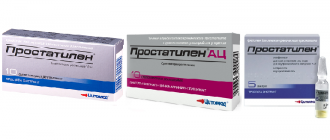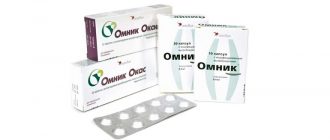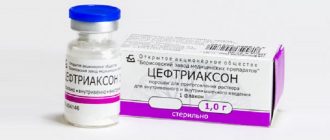Ciprofloxacin is a powerful antibacterial drug belonging to the group of first-generation fluoroquinolones. Its use is possible in complex treatment of the disease.
Ciprofloxacin for prostatitis requires long-term use, but is able to cope with most pathogens.
Release form and composition
Ciprofloxacin is produced in the form of tablets, ointment, drops and solution for infusion. Produced by many pharmaceutical companies.
Tablets and droppers are used to treat prostatitis. Other forms of release are prescribed for other diseases.
The active ingredient of the drug is ciprofloxacin.
Pills
The concentration of the active substance is 250, 500 and 750 mg per tablet.
The appearance of the tablets depends on the manufacturer of the medicine. It can be:
- round in shape, covered with a film shell of various colors;
- oval in shape with a beveled edge, white.
The following excipients are used: cellulose, corn starch, magnesium stearate, lactose, talc.
Pharmacies sell:
- cardboard packs of 10-20 tablets;
- plastic jars of 100 pieces.
Infusions
The solution for intravenous administration is available in two forms: ready-made solution and concentrate for dilution.
The solution for infusion is produced in 2% concentration. Sold in glass bottles of 100 ml. Shelf life 2 years.
pharmachologic effect
Ciprofloxacin is a broad-spectrum antibiotic. Affects DNA gyrase of microorganisms, preventing their reproduction.
Affects most bacteria that cause inflammation of the prostate:
- gram negative;
- gram-positive;
- intracellular pathogens.
It affects microorganisms not only in a state of division, but also in a state of rest. This allows you to immediately prescribe treatment with this drug, without waiting for the pathogen to be identified.
Indications
The drug is prescribed for the treatment of a variety of diseases caused by pathogenic bacteria:
- in urology (cystitis, pyelonephritis, prostatitis);
- in gynecology (adnexitis, postpartum infections);
- for ENT infections (bronchitis, pneumonia, sore throat, otitis media);
- for infectious lesions of the skin and soft tissues (burns, bedsores, infected wounds);
- for infections in the gastrointestinal tract (salmonellosis, peritonitis, cholera, etc.).
Contraindications
Like other antibiotics, Ciprofloxacin has a number of contraindications:
- intolerance to the components of the drug;
- pseudomembranous colitis;
- tendon diseases;
- should be used with caution in case of serious disorders of the liver and kidneys;
- incompatible with certain medications (for example, Tizanidine).
Before use, be sure to consult a doctor.
Among the side effects observed when taking the drug are:
- allergic reactions (itching, urticaria, facial swelling);
- decreased blood pressure, tachycardia;
- headache and dizziness;
- nausea, vomiting, increased gas formation, diarrhea.
Instructions for use
The instructions for use of Ciprofloxacin for prostatitis indicate that the dosage and duration of treatment directly depends on the severity of the disease and the individual characteristics of the patient.
Pills
For prostatitis, the dosage of Ciprofloxacin is from 250 to 750 mg of a single dose of medication. The treatment regimen depends on the form of the disease:
- For chronic prostatitis, and also if the symptoms of the disease do not bother the patient much, the dose of the drug is 250 mg per day.
- For acute prostatitis, at least 500 mg of medication is prescribed, divided into two doses per day. In case of severe disease, the dose can be increased to 1.5 g/day.
When taking the medication, it is important to maintain a 12-hour interval between doses.
The duration of treatment is 7-10 days. Even if symptoms disappear, you must take the drug for another 2 days.
Infusions
When prescribing IVs, the frequency of administration is also observed - 2 times a day. Injection of the drug is acceptable. But drip administration over half an hour is preferable.
The duration of treatment for acute prostatitis is 1-2 weeks.
When using infusions, it is necessary to comply with the drinking regime.
Analogs
If replacement is necessary, antibiotics of the same drug group may be prescribed:
- Tsiprolet.
- Cipran.
- Ciprobay.
Or drugs with other active ingredients:
- Ofloxacin.
- Levofloxacin.
- Norfloxacin.



